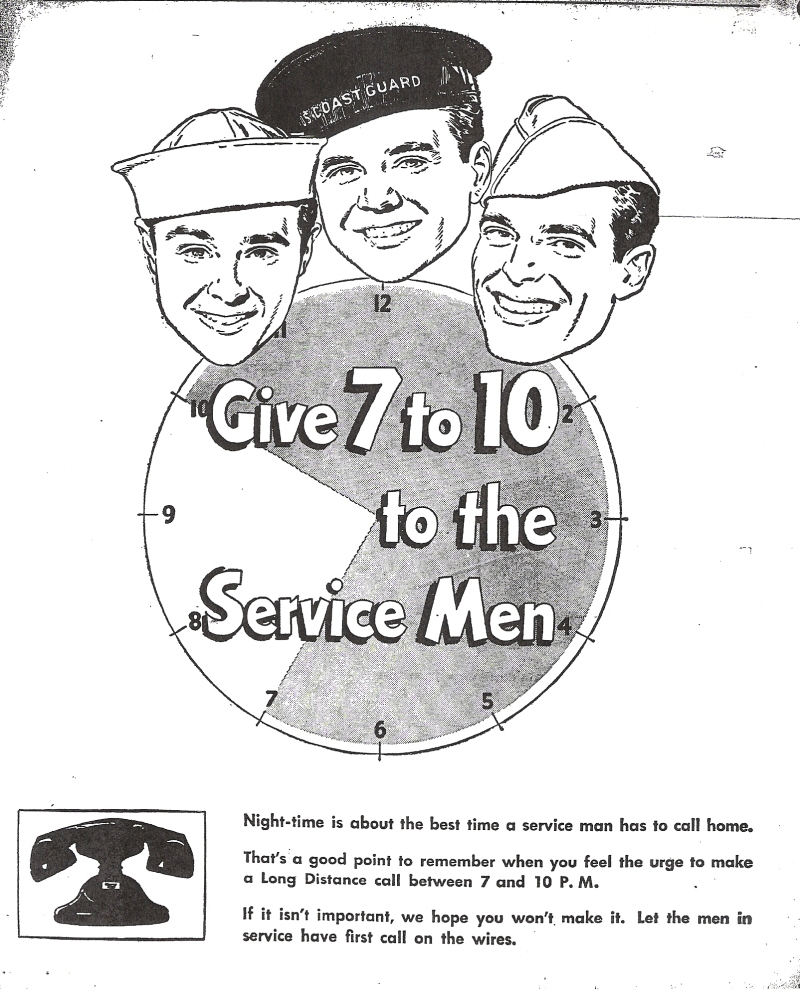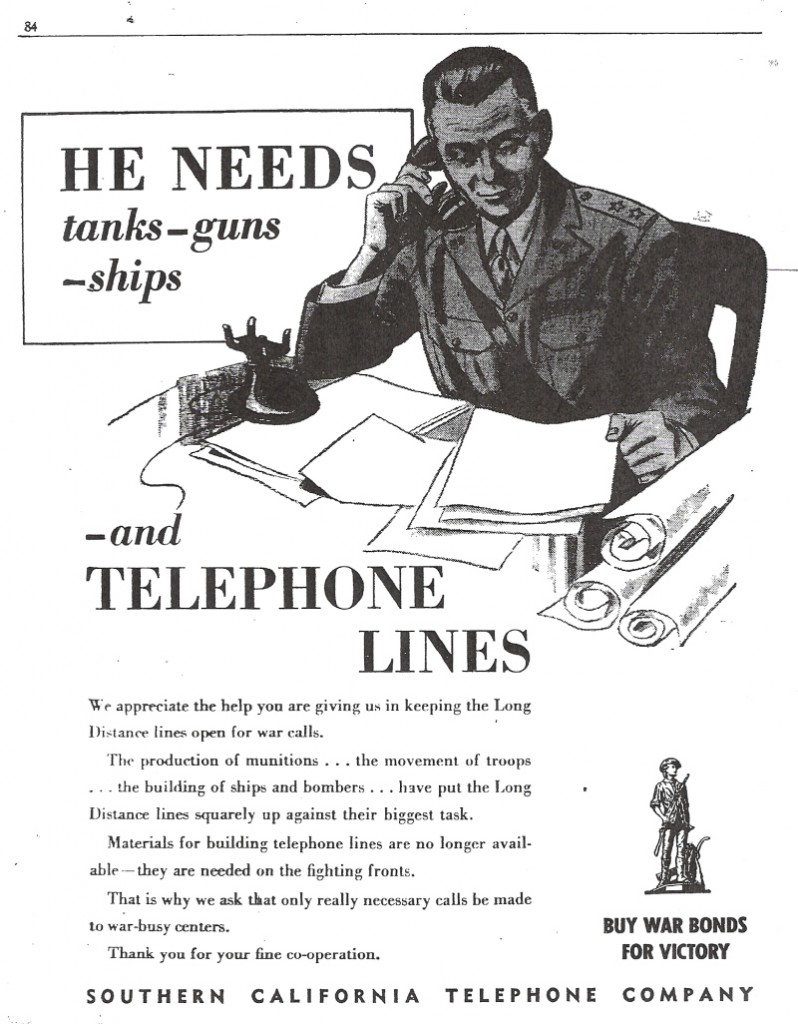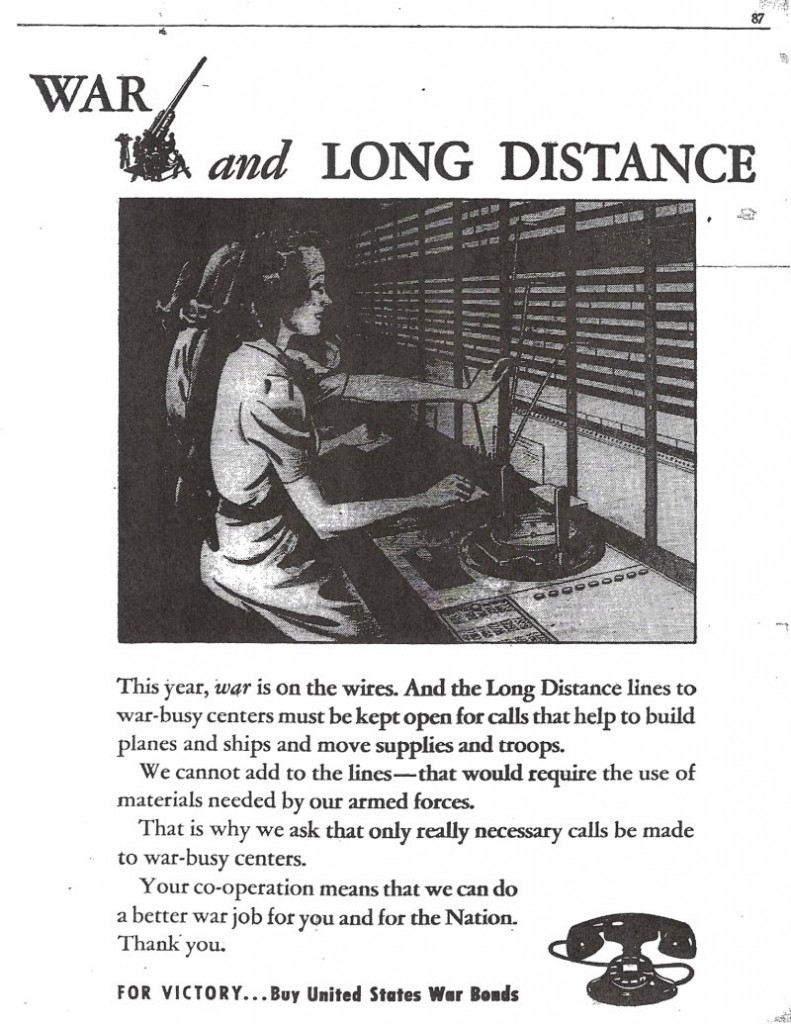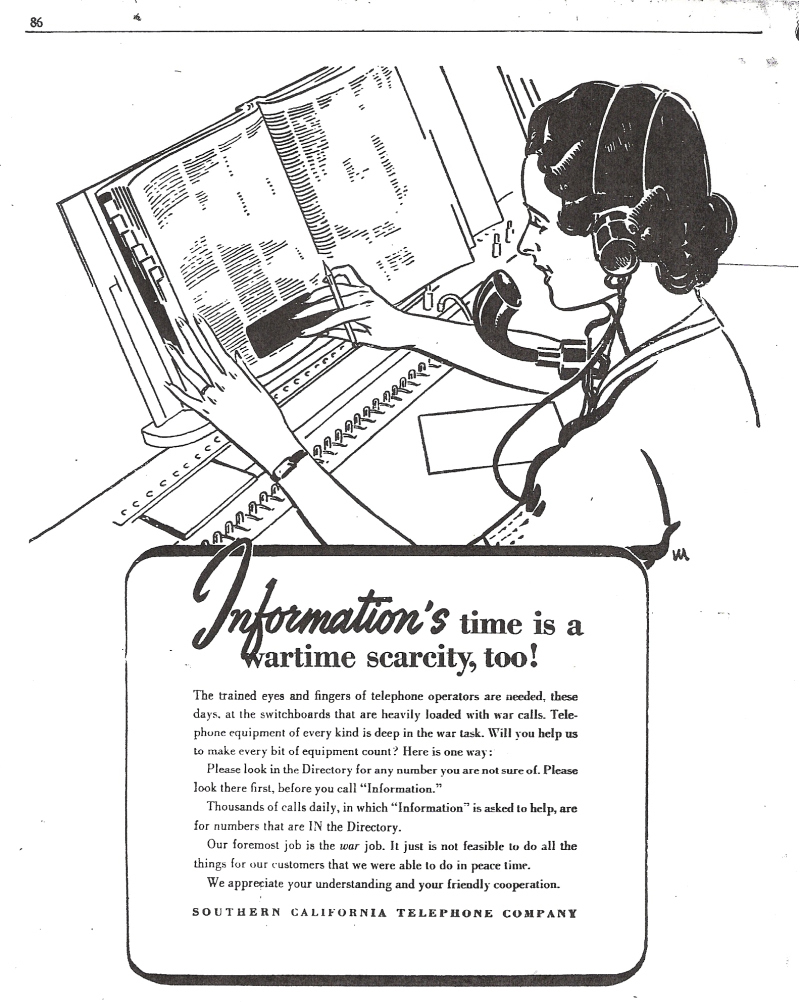I’ve previously blogged about how, during World War II, Americans were expected to sacrifice in ways that we simply do not expect Americans to sacrifice today. Specifically, my post addresses how people were encouraged to save gas and carpool (“Hitler rides in the empty seat!”), but people made all sorts of sacrifices: from going to work, to victory gardens, to eschewing panty hose.
Penny R. sent in another example that I found really interesting, staying off of phone lines during the hours when soldiers were likely to call home. These government-sponsored ads were found in a 1944 Southern California Telephone Company phone books for West Los Angeles (found at This Book Is for You):

Text: “Night-time is about the best time a service man has to call home. That’s a good point to remember when you feel the urge to make a Long Distance call between 7 and 10 P.M. If it isn’t important, we hope you won’t make it. Let the men in service have first call on the wires.”

Text: “We appreciate the help you are giving us in keeping the Long Distance lines open for war calls. The production of munitions . . . the movement of troops . . . the building of ships and bombers . . . have put the Long Distance lines squarely up against their biggest task. Materials for building telephone lines are no longer available — they are needed on the fighting fronts. That is why we ask that only really necessary calls be made to war-busy centers. Thank you for your fine co-operation.”

Text: “This year, war is on the wires. And the Long Distance lines to war-busy centers must be kept open for calls that help to build planes and ships and move supplies and troops. We cannot add to the lines–that would require the use of materials needed by our armed forces. That is why we ask that only really necessary calls be made to war-busy centers. Your co-operation means that we can do a better war job for you and for the Nation. Thank you.”

Text: “The trained eyes and fingers of telephone operators are needed, these days, at the switchboards that are heavily loaded with war calls. Telephone equipment of every kind is deep in the war task. Will you help us to make every bit of equipment count? Here is one way: Please look in the Directory for any number you are not sure of. Please look there first before you call ‘Information.’ Thousands of calls daily, in which ‘Information’ is asked to help, are for numbers that are IN the Directory. Our foremost job is the war job. It just is not feasible to do all the things for our customers that we were able to do in peace time. We appreciate your understanding and your friendly cooperation.”
Can you imagine being asked to stay off the internet every evening? Impossible!!!

Comments 9
Sociological Images » WORLD WAR II PROPAGANDA TO STAY OFF THE PHONES | paydayloan — February 20, 2009
[...] is deep in the war task. Will you help us to make every bit … See the original post here: Sociological Images » WORLD WAR II PROPAGANDA TO STAY OFF THE PHONES Leave a [...]
Ben Ostrowsky — February 20, 2009
I'll eschew panty hoes. It's a tough sacrifice, but whipping the Hun is worth it. Nothing but pantyless hoes for me from now on!
Elena — February 20, 2009
7 - 10 PM in the US (which TZ?) has to correspond with the middle of the night in Central European Time, we're some 6 to 8 hours ahead IIRC. Did they really want to make soldiers call home at those hours?
I guess this ad was for the guys fighting in the Pacific Theater, otherwise it makes little sense.
chuk — February 20, 2009
What's more interesting to me about this, is that the adds seem to have been put out by the phone companies themselves. I wonder if it was in their economic interest to discourage these calls. If it wasn't, then it really flies in the face of how we think about how businesses ought to run today (aren't there even laws in place against this sort of thing?).
Penny — February 20, 2009
Yes, I think the ads were put out by the phone company itself--it's one of those "good citizens" ads that many companies placed in their own publications, to demonstrate how they were contributing to the war effort.
Dubi — February 22, 2009
Umm... I can quite easily imagine all sorts of requests from citizens/consumers in times of crisis. Examples from my home country (Israel):
1. The electricity company (a state-held monopoly) used to run TV and print ads that called on people to use electricity-intensive appliances such as washing machines during the night rather than during the day, so as to "straighten the line" (of demand for electricity). This actually makes sense, for the same reason that electricity during the peak hours is more expensive than in the dead on night.
2. Israel is currently going through a prolonged drought, leading to such instructions as drying out private gardens and water-intensive public parks. In a previous period of drought the minister who was in charge of water issues (minister of agriculture? I forget) publicly suggested that couples have showers together to save on water. Good times.
Frankly, that I am required to pay for plastic bags in supermarkets (or bring my own) today seems reasonable, but would've sounded ridiculous not too long ago. We're going to see quite a lot of such demands in the future, mainly for ecological reasons. You'll notice that most of them are greeted well, even though a few years ago they would've sounded plain preposterous.
Tripleindemnity — February 25, 2009
"7 - 10 PM in the US (which TZ?) has to correspond with the middle of the night in Central European Time, we’re some 6 to 8 hours ahead IIRC. Did they really want to make soldiers call home at those hours?
I guess this ad was for the guys fighting in the Pacific Theater, otherwise it makes little sense."
Hate to say this, but you're living far too much in the 21st Century. :-)
Ever see old movies where someone would call a long distance operator and then wait around, sometimes for hours, for the call to be placed and the operator to call them back? *That's* the world this is from--that was SOP in the 1940's and earlier. In fact, area codes didn't even begin to be used until 1947--before that there was no real system for direct dialing outside of the local area. Any more distant call required a live operator to place it.
Heck, even most local calls in the United States were still placed via live operators then, I believe, rather than direct dialing. Note all the live operators depicted in the actual ads. And think of how the number and availability of live human operators would limit the total number of calls that could ever be placed at any one time.
These ads were attempting to keep the limited number of US long distance lines free so that the millions of servicemen in camps and deployments around the Continental US could have a chance of getting through to telephone their families--perhaps for the last time for years. As well as keeping the lines free for other wartime communications.
No way these were intended to enable calls from overseas. There were likely only a literal handful of lines available for calls from the UK that would have been almost impossible to get access to. I'd be shocked if there were *any* long distance lines across the Pacific, or if there were there would have been even fewer than from the UK. These ads were intended to save on the use of a valuable US resource.
Civilian Experiences of War » Sociological Images — October 16, 2009
[...] license plate patriotism, sex protest, war is boring, WWII civilian sacrifices (carpooling and staying off the phone), war and euphemism, framing “their” deaths, the silent ranks, U.S. non-news about [...]
Jeanne Rejaunier — May 21, 2018
"...people made all sorts of sacrifices: from going to work, to victory gardens, to eschewing panty hose." - Just a note to let you know that panty hose did not exist in World War II. Women wore "nylon stockings," also known as "nylons." These were secured by either a garter belt or girdle, or in some cases, garters. GI's serving in Europe sometimes gave nylons as gifts to European ladies they were courting. (I believe panty hose first appeared in the early sixties).